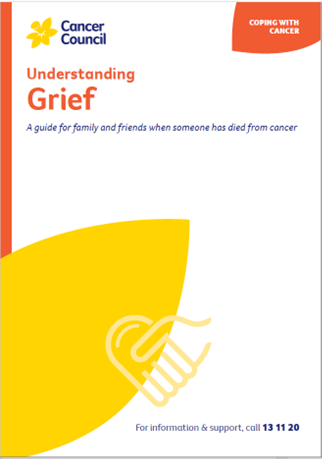- Home
- About Cancer
- Advanced cancer
- Understanding grief
- How you might feel
- Physical symptoms
Physical symptoms
Learn how grief can cause physical symptoms like headaches and exhaustion, and how to manage them.
Learn more about:
- The physical impact of grief
- Difficulty sleeping
- Feeling exhausted
- Changed appetite
- Tips for coping with physical symptoms
The physical impact of grief
Grief is experienced in your body too. The shock of the loss, even if you were expecting it, releases adrenaline and other chemicals. This can make you feel anxious or make it hard to switch off worrying thoughts.
Other physical responses to grief include:
- exhaustion
- fatigue
- headaches
- nausea
- unexplained aches and pains
- changes to appetite
- a tight feeling in the chest and stomach.
Grief can also weaken your immune system, which makes you more likely to catch colds or other infections.
The physical effects of grief on your body can affect your ability to manage your emotions and think clearly. Talk to your doctor about any physical issues that are worrying you or making it harder to cope.
Difficulty sleeping
It’s common for grief to change sleep patterns, from sleeping a lot to sleeping a little. You may find it hard to get up in the morning, fall asleep or stay asleep, or you may have long periods of being awake during the night.
If you’ve been caring for someone, you may have had to be alert during the night in case they needed help. It can take time to adjust to sleeping more soundly again. You may have dreams or nightmares in which you see the person who has died.
Feeling exhausted
Don’t be surprised if you have no energy and feel constantly tired. Adjusting to any major change is exhausting, and too little or too much sleep can make you feel even more tired.
Changed appetite
It is common to have either little appetite or an increased appetite after a loss. Some people also experience an upset stomach, which may last for some time or come and go. Changes to your appetite or weight can make you feel distressed. Please know that you can talk to your GP or counsellor about your concerns.
Tips for coping with physical symptoms
- Try and get some exercise every day. A walk can improve your mood, clear your head, give you more energy and make it easier to sleep. You can try walking, swimming, a team sport, yoga, dancing or a new activity. Even doing housework such as vacuuming or mowing the lawn can help if you’re feeling tense.
- Go to bed and get up at the same time every day.
- If you’re unable to fall asleep, get up and do something relaxing (e.g. read a book, or listen to music or a podcast) until you feel sleepy. Practise slow, deep breathing or progressive muscle relaxation exercises while in bed – this will slow down the mind and allow the body to relax.
- Ask your doctor before using sleeping tablets or natural sleep remedies.
- Get in touch with a support service if you need to talk to someone. Talk to your doctor about seeing a counsellor, social worker or psychologist.
- Limit caffeine, alcohol and electronic devices as they can affect sleep.
- Try to eat a healthy, balanced diet. If you have lost your appetite and are barely eating, try to snack on nourishing, easily digested foods.
- Avoid eating unhealthy foods or eating large amounts of food for comfort. A poor diet can affect your mood.
- Explore other ways to help yourself feel better, such as getting fresh air and exercise in a park, listening to music, or having a bath or massage.
- Try meditation or relaxation to help with the anxiety. There are many recordings, videos and smartphone apps to guide you through different exercises.
Meditation and Relaxation Podcast
Listen to more of our meditation and relaxation podcast for people affected by cancer
Podcast: Coping with Grief
Listen to more episodes from our podcast for people affected by cancer
More resources
A/Prof Lisa Beatty, Associate Professor in Clinical Psychology and Consulting Clinical Psychologist, Flinders University Institute of Mental Health and Wellbeing, SA; Sandra Anderson, Consumer; Dr Alexandra Clinch, Palliative Medicine Specialist and Deputy Director, Palliative Care, Peter MacCallum Cancer Centre and Royal Melbourne Hospital, VIC; Christopher Hall, Chief Executive Officer, Grief Australia; Nathan MacArthur, Specialist Grief Counsellor and Accredited Mental Health Social Worker, Sydney Grief Counselling Services, NSW; Linda Magann, Clinical Nurse Consultant – Palliative Care, St George Hospital, NSW; Palliative Care Australia; Richard Upton, Consumer; Lesley Woods, 13 11 20 Consultant, Cancer Council WA.
View the Cancer Council NSW editorial policy.
View all publications or call 13 11 20 for free printed copies.

